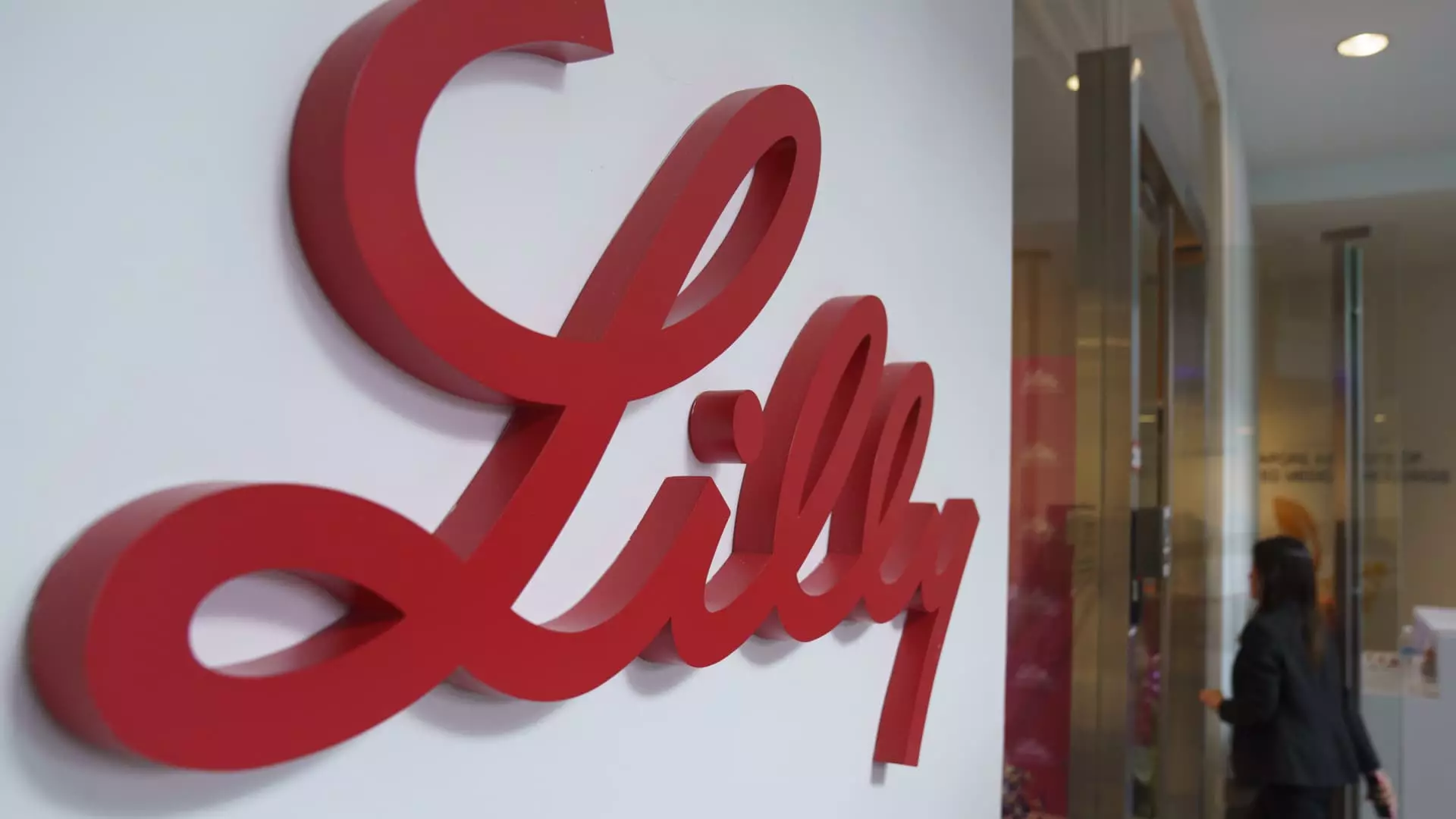Eli Lilly recently caused a stir in the pharmaceutical landscape by announcing first-quarter revenue that exceeded analysts’ expectations. With revenues climbing to $12.73 billion—up a staggering 45% year-over-year—one could assume that the company is riding high. But hold on; the euphoria is undercut by a dark cloud: a significant drop in full-year profit projections due to a crippling $1.57 billion charge tied to a cancer treatment acquisition. This sharp decrease from an earlier estimate of $22.50 to $24 per share to a revised margin of $20.78 to $22.28 raises critical questions about how sustainable Eli Lilly’s growth truly is.
It’s almost as if the company is masking a precarious situation under a veil of impressive sales figures, particularly driven by its diabetes treatment, Mounjaro, which collected $3.84 billion—a jaw-dropping 113% increase from last year. This may suggest a thriving operation, yet the financial acrobatics needed to mitigate the fallout from acquisitions should throw up red flags. The illusion of growth could be fleeting when placed against the harsh realities of corporate expenditures and market volatility.
Tariffs and Short-term Gains: The Price of American Manufacturing?
One cannot ignore the political ramifications embedded within Eli Lilly’s operations, especially regarding the tariffs imposed during the Trump administration. CEO Dave Ricks posits that existing tariffs are bringing critical manufacturing back to U.S. soil—yet, is this genuinely beneficial, or just a superficial fix? While bringing production closer to home ostensibly sounds laudable, it tends to overlook the ethos reeling from the inflation caused by these very tariffs.
Ricks suggests that reducing taxes would foster domestic production, which raises ethical questions. To what extent should tax policy be utilized as a corporate carrot? Shouldn’t companies like Eli Lilly prioritize genuine innovation over the opportunistic gains they expect from government incentives? In a world where EpiPens and insulin are price gouged, the argument for lower taxes as a boon for consumer welfare falls flat.
The Public Health Dilemma: Weight Loss Vs. Diabetes Treatment
The fervor surrounding Eli Lilly’s weight loss drug, Zepbound, which amassed a staggering $2.31 billion in sales, has led to the perception that these drugs are a panacea for America’s health crisis. However, the public should pause to examine the moral quandaries underlying the glamorized success stories. Are we simply incentivizing weight loss solutions while neglecting deeper systemic issues? Yes, shedding pounds can lead to health benefits, but framing it as a straightforward success story glosses over societal health challenges—access to healthy foods, education, and even affordability.
The frenzy surrounding the incretin treatments, including both Mounjaro and Zepbound, has compelled Eli Lilly and its competitors like Novo Nordisk to invest billions in manufacturing capacity. Yet, despite the apparent financial success, the challenges related to supply shortages persist. The FDA’s recent moves to declare a shortage of tirzepatide resolved shouldn’t serve as an excuse for pharmaceutical companies to rest on their laurels. Instead, it reflects broader industry issues regarding equitable access to medications that many desperately need.
Trade-offs and Ethics: A Corporate Balance Sheet in Question
Eli Lilly’s financial performance is tempered by ethical questions that surround its commercialization strategies. The substantial net income of $2.76 billion lends it an air of success, yet beyond the financial forest lies the ethical wilderness! The strategies employed to achieve such profitability can lead to questioning whether the company adheres to principles of transparency and equitability. For all the windfall gained from diabetes and obesity treatments, what are the implications for the patient populations that depend on these drugs?
When faced with such tremendous demand, are Eli Lilly’s manufacturing investments genuinely going into expanding capacity for consumer need, or are they simply another method of spurring profits? The looming specter of price manipulation and market share becomes all too apparent when companies prioritize shareholder profit over altruism that ought to underpin research and development in pharmaceuticals.
Looking Ahead: A Non-Transparent Future?
Eli Lilly’s disclosures and strategies propel us into a future where corporate pharmaceutical ethics remain tantalizingly out of reach. The company’s narrative, bolstered by impressive financial indicators and ingenious marketing ploys, risks overlooking the broader implications of their practices for public health and welfare. As the health crises escalate and stakes rise, we need to critically engage with the ethics of innovation in pharmaceutical development and demand a culture of accountability.
The question looming large is whether Eli Lilly and others in its lane will prioritize ethical growth that compels us forward into a healthier future—or if they will continue to blend corporate greed with convoluted strategies that are more about profits than people. The revelations regarding their financial maneuvers serve as a cautionary tale about the complexities of healthcare capitalism in an era that desperately seeks genuine solutions to health crises.

